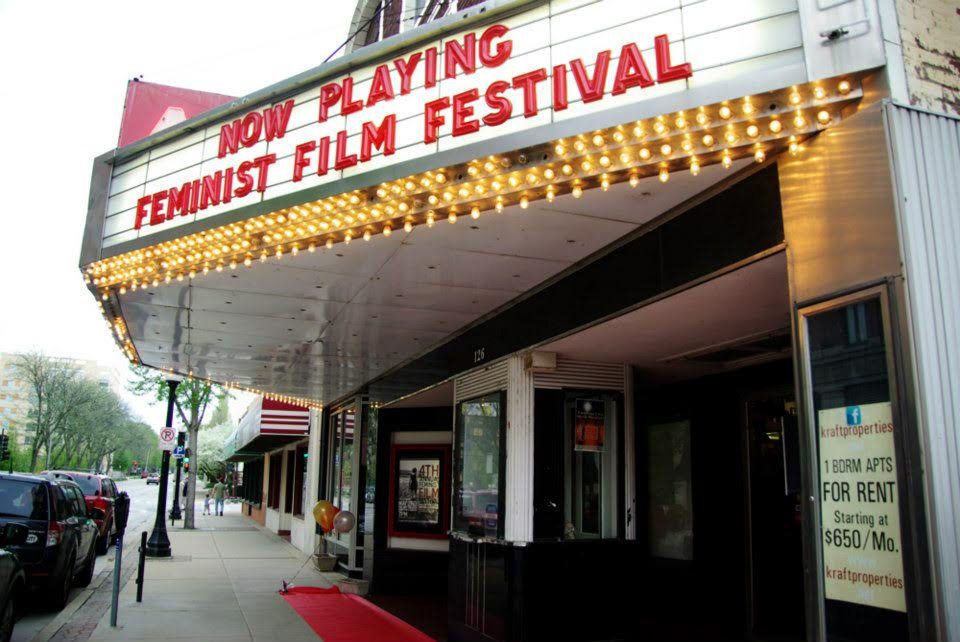Feminist Film Festival gives voice to underrepresented groups
Photo Courtesy of Rachel Storm
The marquee of the Art Theater Co-op for the Feminist Film Festival. The festival, hosted by the Women’s Resource Center, will take place Thursday starting at 7 p.m.
May 3, 2017
Around the University, it is not uncommon to find events that are geared towards creating an inclusive environment for underrepresented groups.
One such event, the Feminist Film Festival, is entering its eighth year of promoting inclusiveness and honoring student filmmakers.
The Feminist Film Festival will take place on Thursday at 7 p.m. in the Art Theater Co-op. The event is put on by the University Women’s Resources Center in order to encourage further discussion and bring light to topics that are not typically represented in film, created by filmmakers from typically underrepresented groups.
Rachel Lauren Storm, assistant director at the Women’s Resources Center, started the Feminist Film Festival when she began working at the University in 2009.
Storm said her background and interest in art was the inspiration for starting the Feminist Film Festival.
Get The Daily Illini in your inbox!
“I see the arts as a language that we can all speak, that we all have access to. It really transcends other kinds of communication,” Storm said, “So with the Feminist Film Festival I wanted to create an opportunity for students to create cinematic work that could actually be shared in a public venue and begin conversations about a wide variety of feminist and social justice topics.”
The Women’s Resources Center encourages any student filmmaker to submit a film and tends to receive films ranging from comedies to documentaries, each with some kind of connection to feminism.
“We have a very expansive, as we all should, definition of feminism, and we want to leave a lot of space for us to all incorporate our unique vantage points or positionality when it comes to feminism, so that’s something that we invite,” Storm said.
The unique backgrounds of the filmmakers, such as culture, gender and sex differences, results in films that deal with a wide variety of topics special to each individual.
Liza Sylvestre, graduate student in MFA, started losing her hearing when she was 6 years old.
Her film “Wha_i_ I _old you a __ory in a language I _an _ear?” invites the audience to experience a piece of writing the way the Sylvestre would: only hearing certain syllables.
Sylvestre is aware of the fact that the way she hears the world is drastically different from how most people hear the world, and she discusses overcoming this obstacle when filming her work.
“I wanted to created something that would illustrate how I hear,” Sylvestre wrote in an email, “So I filmed myself performing a piece of my writing. First I pronounce everything as I normally talk, then I recite the same piece of writing but I only pronounce the parts of each word that I am able to hear.”
Films such as Sylvestre’s may contain heavy content such as mental illnesses, brutality and violence, but the film festival also has lighter films about topics such as the beauty industry and relationships.
The Women’s Resources Center seeks out films that tell untold stories.
These films are meant to speak back to power or truth about topics such as patriarchy, racism, sexism, homophobia and other social justice issues.
Elizabeth Ortiz, filmmaker and senior in LAS, produced “A Short Documentary: Olguiemar Freyre” set out to tell an otherwise untold story, such as the one about her friend, out in the media.
“The media that gets put out is a reflection of what our society looks like,” Ortiz said. “When identities and lives aren’t represented, it can be another way of saying, ‘hey, you don’t exist.’”
Storm recognized that the media’s reflection of society is typically male-dominated. In fact, in order for a film to be considered feminist, the Women’s Resources Center puts it to the Bechdel Test.
The only criteria for a film to be feminist, according to this test, is for there to be more than one female role, for the females to talk to each other and for them to talk about something other than a male.
“You would be astounded at how few films pass the Bechdel Test, absolutely how few films,” Storm said. “If there is more than one female character in a film usually they’re not talking to each other at all, and if they do talk to each other in the film, they talk to each other about men.”
From this basic criteria, the Women’s Resources Center distinguishes feminist films from others, but Storm said that the filmmakers present their own cases and foster discussion about why their films are feminist.
At the end of the festival awards are presented for Best Experimental Film, Best Narrative Film, Best Documentary Film, Cinematographic Achievement, Fiercely Feminist Achievement and Audience Impact.
“Film speaks to many of our senses simultaneously, which makes it a powerful tool for sharing stories of any type,” Sylvestre said. “A film festival that gives a place specifically for underrepresented groups of people has the potential to share a rich diversity of experiences in a short period of time.”






